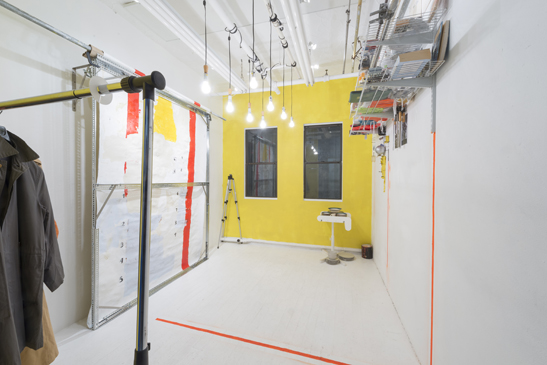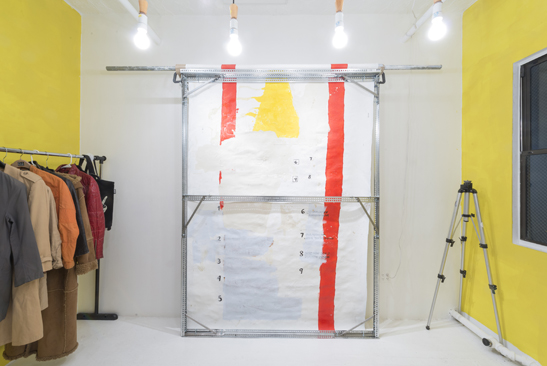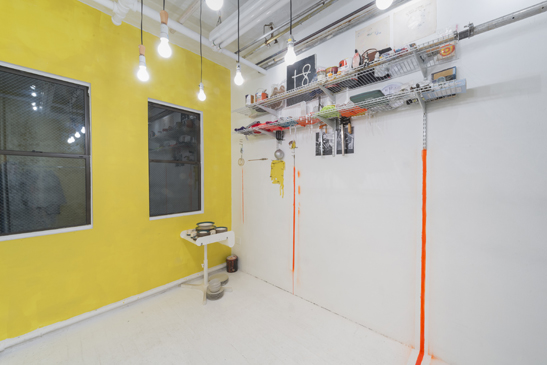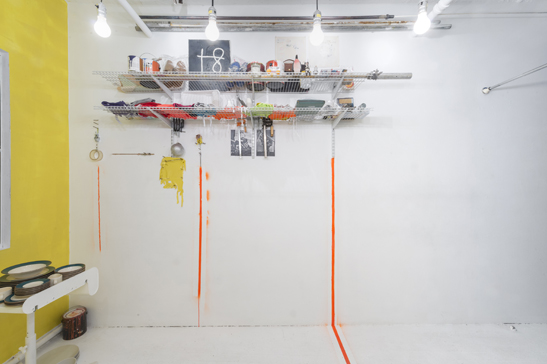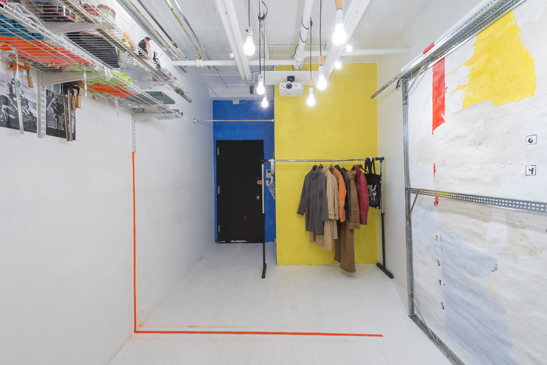PS3*
A groundbreaking, missed party
December 2, 2017–January 14, 2018
Reception: Saturday December 2, 6–9pm
One cortado please, says Pedro
Make it two, I say
Cortado is a small coffee in a small very small coffee cup with a drop of milk that cuts the intense brown with the white. Very white.
His cap resting on the table. The table outside. Made of wood. His misty eyes from the morning light that makes them light up because of the sensibility that moves him and touches his lacrimal.
Pedro is vegan. Pedro is vegetarian since he left his parents house. Pedro is vegan since he moved to New York. I am vegetarian though I sometimes eat fish. I am not a vegetarian. I eat fish. When I met Pedro who is vegan I decided not to eat neither red meat anymore nor white meat except for fish. Some days ago Pedro walked by two men on the street. One man said to the other that Pedro seemed to carry with him a child. Inside. When we enter to a hotel we do it through the door, the big one, the one with the sign on top that says entrance or the name of the hotel or something similar. The main one. The main one? Pedro says that what he creates and thinks for this exhibition comes from a juxtaposition of things he has been going through in his life and of an intention of getting into a place through the service door, the back door, the one that employees use, the one that has a sign of private property do not come in authorized personnel only, as a psychic deviation. A shortcut. We are in a time of approximation, of change. Painting is contemplative, says Pedro. This is its difference with what is not painting that is all the rest.
Painting is contemplative, I repeat
Art for the sake of art, says him
Sometimes I ask myself what I would like to ask someone else.
Catalina: Who are the artists that have influenced your work is the most aggressive question someone can ask somebody, sorry for the rudeness, but what would you reply?
Catalina: I would reply something like it's all in the street, out there, nail salons, food establishments. For Pedro it is definitely food that changes him year by year, month by month, minute by minute. The food, to which his body adapts to, the one that makes him go out to the street every day, the one that keeps him on his feet. It is a way of living doing it in the way each one does it.
Things to do:
-Look up self-sufficient farms. Build one. See how it is done first. Budget.
-Everything is so absolutely controlled. Try to avoid control. Escape for a while.
-Accept the error. Human.
For halloween he bought spicy pumpkin seeds. I tell him the spice is not spicy, it's cinnamon. It's with what our grandmothers and mothers used to cook the rice with milk and the natilla. The mist is a steam in the air. Pedro prefers almond milk. Soy milk is too liquidy. Spontaneity is what we need to get out of this closed circuit in which we get trapped: routine trends alienation superficiality plastics packaging and the habits we create, says Pedro. Here today now un-alienate us and feel what he says he feels. What he feels. And just that. Just this. Feel. To be...
Mist.
Maybe it's just a cloud passing by.
Animals have a life cycle. We have a life cycle. Both conclude in death and nevertheless they don't conclude. A party is a celebration. Celebrate we celebrate many things with no sense, others make sense. Sense is a subjective and collective construction. Personal and cultural. Death is celebrated. It is a macabre festivity. Sinister. The movie The Exterminating Angel by Luis Buñuel shows the development of a party into tragedy with a subjacent theme: the impossibility of getting out of a limited space. Finite. Which doesn't have everything that makes life possible. Luxury dematerializes and becomes mundane. The reason is nothing and everything.
Pedro thinks about excessive consumption, the immeasurable slaughter of animals that are not born to be treated as what they are, but as objects. Objectified. Animals are not objects, we are living beings. In Spain 40 million hams are sold per year. While Pedro is saying this to me he drinks a cortado from a small paperboard cup with a big blue P printed in the surface of it and it is blue as his hair. As his eyes. The reflection. The mist is in the eyes of who can see it. In the eyes of Pedro that are blue you can see the reflection of his hair that is blue, maybe his hair is reflected on his eyes maybe his eyes are a reflection of his hair.
Some days ago I went to a party. Then I left the party.
*
Un cortado por favor, dice Pedro
Que sean dos, agrego yo
El cortado es un café en taza chica muy chica con una gota de leche que corta lo marrón intenso café con el blanco. Muy blanco.
Su gorra apoyada en la mesa. La mesa de afuera. De madera. Sus ojos vidriados por la luz matinal que los hace brillar como vitreosos del vidrio o por la sensibilidad que lo emociona y toca su lagrimal.
Pedro es vegano. Pedro es vegetariano desde que se independizó de la casa sus padres. Pedro es vegano desde que se mudó a New York. Yo soy vegetariana aunque a veces como pescado. No soy vegetariana. Como pescado. Cuando lo conocí a Pedro que es vegano decidí no comer más carne roja ni carne blanca a excepción del pescado. Hace unos días Pedro se cruzó a dos señores mientras caminaba por la calle. Uno le dijo al otro que parecía llevar consigo un niño. Adentro. Cuando entramos a un hotel lo hacemos por la puerta, la grande, la que tiene el cartel arriba que dice entrada o el nombre del hotel o algo así. La principal ¿La principal? Pedro comenta que el tiempo en el que piensa y crea su obra para esta muestra deviene de una yuxtaposición de cosas que fue transitando en su vida y de una intención de entrar por la puerta trasera, la de servicio, la que usan los empleados, la que tiene el cartel de prohibido pasar solo personal autorizado, como una desviación psíquica. Un atajo. Estamos en un tiempo de aproximación y de cambio. La pintura es contemplativa, dice Pedro. Esa es su diferencia con lo que no es pintura que es todo el resto.
La pintura es contemplativa, repito
Arte por el arte, dice Pedro
A veces me pregunto a mí misma lo que quisiera preguntarle a otros.
Catalina: Quiénes son los artistas que más influenciaron tu obra es la pregunta más agresiva que se le puede preguntar a alguien, perdón por la agresión, pero ¿vos qué responderías?
Catalina: yo respondería algo así como que está todo en la calle, ahí afuera, las uñas, la comida. Para Pedro es definitivamente la comida lo que lo transforma año a año, mes a mes, minuto a minuto. La comida, a la que se adapta su cuerpo, por la que sale a la calle cada día, por la que se mantiene de pie. Es un estilo de vida hacerlo de la manera en que cada uno lo hace.
Lista de cosas para hacer:
-Buscar granjas autosuficientes. Armar una. Ver cómo se arma primero. Presupuesto.
-Está todo tan absolutamente controlado. Intentar evadir el control. Escapar por un rato.
-Aceptar el error. Humano.
Para halloween compró semillas de calabaza especiadas. Le digo que la especia no es picante, es canela. Es lo que usaban nuestras abuelas y mamás para cocinar el arroz con leche y la natilla. La niebla es un vapor en el aire. Pedro prefiere la leche de almendras. La de soja es muy aguada. Espontaneidad es lo que necesitamos para salir de este circuito cerrado en el que nos encerramos: rutina modas alienación superficialidad plásticos envases y los hábitos que creamos, dice Pedro. Acá hoy ahora desalienizarnos y sentir lo que él dice que siente. Lo que siente. Y solo eso. Solo esto. Sentir. Estar...
Niebla.
Tal vez sea solo una nube pasajera.
Los animales tienen un ciclo de vida. Nosotros tenemos un ciclo de vida. Ambos concluyen en la muerte y sin embargo no concluyen. Una fiesta es una celebración. Celebrarse se celebran muchas cosas sin sentido, otras con sentido. El sentido es una construcción subjetiva y colectiva. Personal y cultural. La muerte se celebra. Es una festividad macabra. Siniestra. La película El Ángel Exterminador de Luis Buñuel muestra el desencadenamiento de una fiesta en una tragedia con un tema subyacente: la imposibilidad de salir de un espacio que es limitado. Finito. Que no tiene todo lo que nos posibilita la vida. El lujo se desmaterializa y se vuelve mundano. La razón es ninguna y es todas.
Pedro piensa en el consumo excesivo, la matanza inconmensurable de animales que no nacen para ser tratados como lo que son, si no como objetos. Objetificados. Los animales no son objetos, somos seres vivos. En España se venden alrededor de 40 millones de jamones al año. Mientras Pedro me cuenta ésto toma un cortado en una taza de cartón con la P en azul grande impresa en la superficie y es azul como su pelo. Como sus ojos. El reflejo. La niebla está en los ojos de quien la mira. En los ojos de Pedro que son azules se ve el reflejo de su pelo que es azul, tal vez su pelo se refleje en sus ojos tal vez sus ojos sean un reflejo de su pelo.
Hace poco fui a una fiesta. Después me fui de la fiesta.
– Catalina Arzani
PS3* (also known as Pedro Sanchez III) is an interdisciplinary artist and filmmaker born in Madrid and based in New York, NY. His work has been shown in galleries, film festivals and venues such as Y Gallery, WhiteBox, Emily Harvey Foundation, Abrons Arts Center, Christopher Henry Gallery, De Chiara & Stuart Gallery, MC Gallery in New York, NY; and internationally at The Cannes Film Festival, Tokyo Striped House Gallery, TSUTAYA Tokyo Roppongi, Okurayama Gallery (Yokohama), Plaza Gallery (Tokyo) FEM6: Festival Edition Madrid 2006, 57 Gallery (Madrid), and East End Open Cable Studios, London (organized by Whitechapel Gallery).

